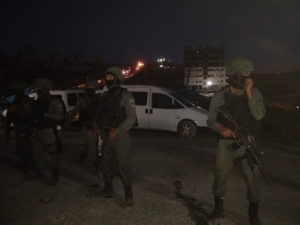All through the night on July 21 and into the morning of July 22, a few dozen Palestinian, international and Israeli activists gathered in the Palestinian village of Wadi al-Hummus located in the Sur Baher region south of Jerusalem to stand with Palestinians who were in danger of losing their homes at the hands of the Israeli government. Multiple homes and a partially constructed apartment building in the village were handed demolition orders in previous years, but local Palestinians were able to defeat the orders in court because the homes were built on land administered by the Palestinian Authority in the West Bank — what is known as an “Area A” region of the West Bank, where Israel has no jurisdiction.
A smaller groups of activists were able to delay the demolition throughout Saturday night and Sunday morning, but on Sunday afternoon, the leaders of the Palestinian village received word that the Israeli armed forces intended to demolish the buildings the following day. In response, a call was sent out for as many people as possible to be present when the demolitions were slated to begin. Hamada, a Palestinian leader in Wadi al-Hummus, said in a July 21 video interview published by International Solidarity Movement: “If they demolish the buildings, the families will stay here. They will build a camp, because they don’t have any money. They don’t have other land to go to do new construction. They are without the ability to do that. So where will they go? Either they will kill themselves, or they will live on the destroyed buildings in camps.”
Recent Israeli practice has been to carry out demolitions and other activities that have been ruled illegal by international law in the early morning to reduce the public outcry. To counter this strategy, the people of Wadi Al-Hummus began gathering the night before, drinking coffee and strategizing with their groups in advance of the escalation. International activists from the International Solidarity Movement, Free Jerusalem, All That’s Left and international peacekeeping teams were given sleeping quarters in the residence of one of the affected homeowners, Ismail Obeide, as well as in nearby offices and homes.

But before 3 am on July 22, Israeli bulldozers, military vehicles and busloads of police and military units entered the valley. Over the course of the next hour or so, 900 Israeli armed forces, including border police, arrived on the scene — along with tanks, police vehicles, cranes, and even a drone. Many of the vehicles headed straight for a few uninhabited houses to begin demolition, while Palestinian and international activists watched and documented what was happening.
Around 4 am, the call to prayer rang out, and many of the Palestinians keeping vigil through the night stopped to pray in the basement of one of the homes slated for demolition. Around 5 am, police started shepherding people away from that home and down the street. A grandfather of one of the homeowners fell in front of the Israeli soldiers as he was being pushed away. His neighbors came to support him and find him a place to sit and recover from the shock of losing his home.
At the same time, Palestinian residents and international activists in both of the houses slated to be demolished were dragged out. Israeli police used tear gas, pepper spray, rubber-coated steel bullets, and they violently pushed the peaceful resisters down flights of stairs; kicking, strangling and butting them in the face with their guns. Bethany, one of the activists with ISM, said in a story published on ISM Palestine’s website: “I couldn’t believe the pure aggression they were using against us. As they dragged me by my hair as I choked from being strangled and the tear gas, I heard them laughing at me. We were unarmed civilians using peaceful means to try and delay them destroying Ismail and his family’s home that they worked so hard to build. Hundreds of soldiers were bussed in to do this. Is a house demolition a military operation anywhere else in the world? This is the reality of life for Palestinians living under Israeli occupation.”
Over the course of the next few hours, the Israeli armed forces demolished the houses. The action has been met with international outcry. Maja Kocijancic, the European Union’s spokesperson on external affairs said, “Israel’s settlement policy, including actions taken in that context, such as forced transfers, evictions, demolitions and confiscations of homes, is illegal under international law. In line with the EU’s long-standing position, we expect the Israeli authorities to immediately halt the ongoing demolitions.” In the city of Ramallah on June 23, Palestinians protested in response to the demolitions. Many are worried about the precedent this demolition sets for further violence by the Israeli state against Palestinians.





